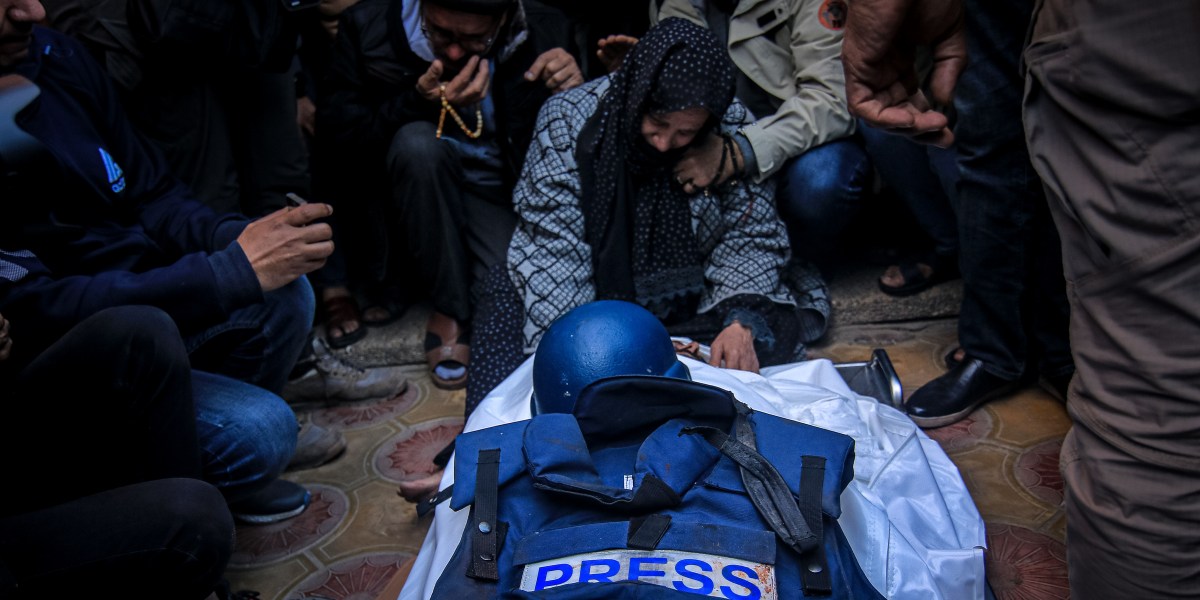- cross-posted to:
- news@beehaw.org
- cross-posted to:
- news@beehaw.org
“IT WAS AS if a storm had targeted us.” On the afternoon of December 15, an Israeli airstrike slammed into the Farhana school in Khan Younis where Al Jazeera Gaza bureau chief Wael al-Dahdouh and his cameraman, Samer Abu Daqqa, had just wrapped up filming the aftermath of an earlier bombardment in the area.
Dahdouh was thrown to the ground. “I lost balance to the point of faintly losing consciousness until I regained my strength,” he told The Intercept. “I tried to get up in any way because I was sure that another missile would target us — from our experience that’s what usually happens.” Dahdouh realized he was bleeding profusely from the arm and that if he didn’t get medical attention, he would die. He had also temporarily lost much of his hearing from the blast. He looked over and saw the three Civil Defense workers who had been accompanying the two journalists had been killed.
“In those milliseconds I thought I couldn’t offer him anything. I couldn’t. And he couldn’t move, he couldn’t get up.” Then, he saw Abu Daqqa lying on the ground some distance away. “He was trying to get up and it seemed like he was screaming,” Dahdouh said. “In those milliseconds I thought I couldn’t offer him anything. I couldn’t. And he couldn’t move, he couldn’t get up. I decided to take advantage of the remaining glimmer of hope, which was to try to go towards the ambulance.”
Dahdouh somehow managed to make his way across the rubble to an ambulance hundreds of meters away and was evacuated to a nearby hospital. But Abu Daqqa, wounded in the lower part of his body, could not walk to the ambulance and was left lying on the ground. Hours went by, but emergency workers were unable to reach him without approval from the Israeli military. As his life slipped away, Al Jazeera posted a live counter on its broadcast showing the number of hours and minutes since Abu Daqqa had been wounded. When emergency crews were finally able to reach Abu Daqqa over five hours later, he was dead.



Accrding to Merriam-Webster it means “opposition to the establishment or support of the state of Israel : opposition to Zionism”.
Problems develop when people either don’t know, or forget, the history of it … because anti-Zionism was “created by Jews, not their enemies”.
I recommend reading that NYT article to understand why many Jews, prior to WW2, weren’t enamoured with the idea of a Jewish state. Wikipedia also has some relevant info on the history of anti-Zionism.
I can understand this idea of anti Zionism from before the state of Israel existed. There were options at that time about how to do things. But now we’re here some 70 years later and we have millions of Jews that have been born and grown up in a Jewish state for generations. So in the context of today’s reality, I’m trying to understand what does anti Zionism mean?
Like does it mean that Israel should continue to exist, but not explicitly be a Jewish state? Or maybe some other change to how it’s administered? Or it should not exist at all? If it shouldn’t exist, then what about the millions of Jews that live there? It’s not clear to me what anti Zionism means today.
You will find regularly on Lemmy the call for the destruction of Israel. They literally mean Jews shouldn’t have a homeland. Many radicals are this way, including among the “Palestinians”, that’s why they have rejected a 2-state solution with Israel five times.